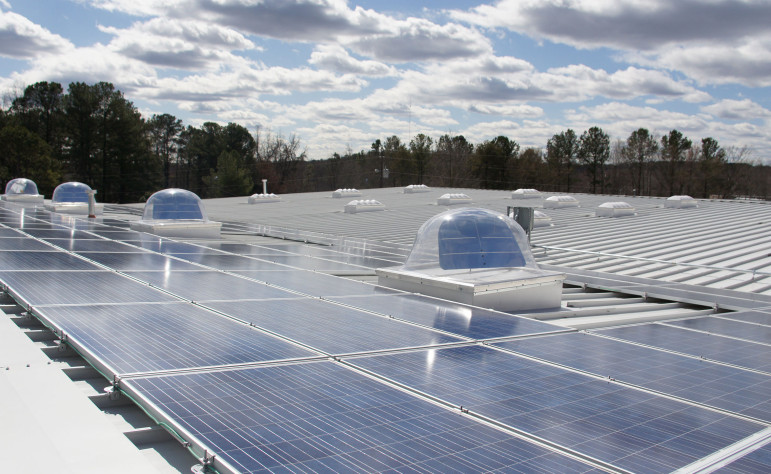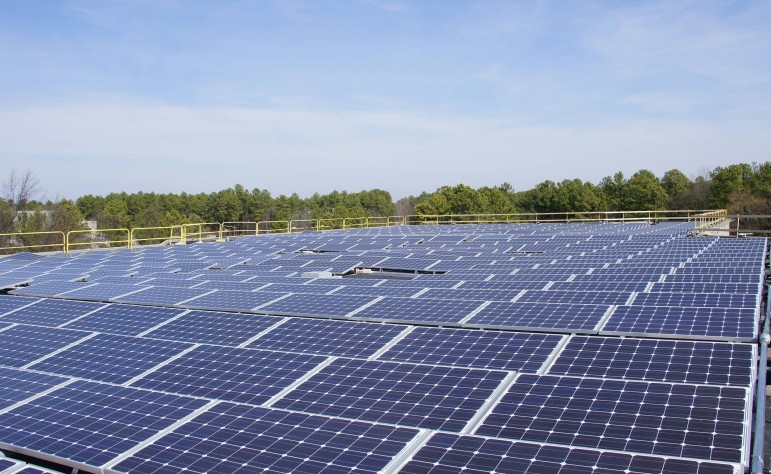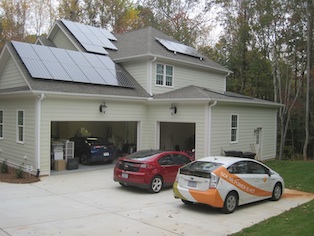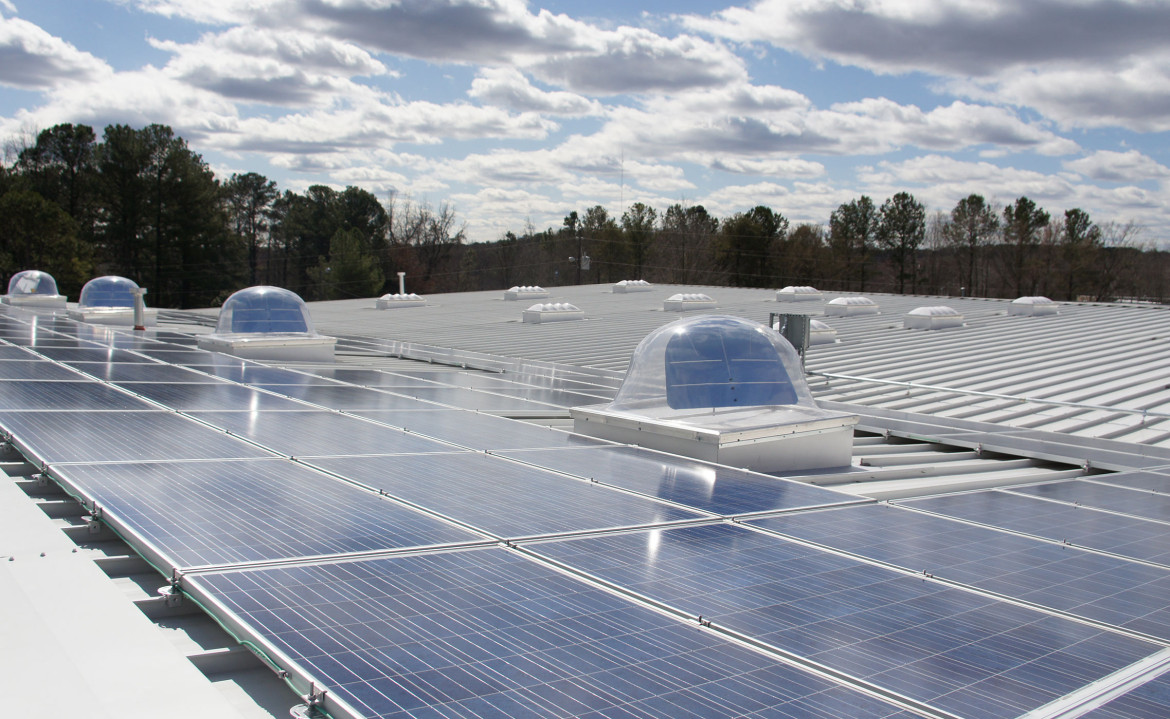When City Council members officially endorsed the Solarize Raleigh initiative in November, there was little indication that the program’s most vocal critics would soon emerge from inside the very industry it was meant to promote.
Managed by the North Carolina Solar Center, which received a $15,000 grant from the Department of Energy’s SunShot initiative, the Solarize Raleigh program is intended to help lower the cost for homeowners who want to install photovoltaic panels by establishing a bulk purchasing program that could lead to volume-based discounts on solar equipment.
Steve Kalland, executive director of the NC Solar Center, said the program would also serve to grow the overall market for solar energy in Raleigh and raise awareness of the benefits to homeowners of installing the photovoltaic panels that generate solar energy.
“We looked at data from Solarize programs around the country,” Kalland said, “and the conclusion was that there is a pretty good benefit to the participants in the programs, and that the market seems to get larger and projects tend to be less expensive going forward, so it’s kind of the ‘rising tide lifts all ships’ concept.”

Baker Renewable Energy
Solar panels on on the roof of a building on Lake Wheeler Road. This installation will offset the building’s energy usage; enough energy to power nearly 3 homes per year.
The concern for some local installers such as Dan Lezama, who owns Sun Dollar Energy, is that the program is more likely to benefit larger companies and would not provide the kind of cost-savings it touts.
“I can’t do all the paperwork, jump through all the hoops – I can’t possibly meet all of the time commitments; and let’s say we did get 50-100 jobs – we couldn’t do it,” Lezama said.
“The question is, these kind of programs then become favorable to the larger companies, not the small guys, and the small guys get kind of squashed.”
In theory, most of the savings generated by the bulk-purchasing program would come in the form of lower administrative and marketing costs, as the installers would need to do less of the legwork typically associated with generating solar sales.
Stew Miller, the president of Yes Solar, which was selected to serve as the installer for the Solarize Durham program, said the bulk-purchasing aspect has allowed his company to reduce costs by making multiple visits in one neighborhood, and obtain better deals from their suppliers when they are able to guarantee future business.
Lezama, however, said the significance of these savings may be difficult to measure, because the prices he has seen for solar equipment and their associated installation costs have been “falling steadily for the last seven years; so even last year the prices were 20 percent higher than they are now.”
“I feel personally that [Solarize] is a sales tactic – you have to call it what it is,” Lezama said.
“I have no problem with competition in the marketplace; I think the issue is, should the city really be endorsing this program?”

Baker Renewable Energy
Solar panels on the roof of a business in RTP.
A Nuanced Issue
Jason Epstein has worked in the renewable energy industry for many years and at Baker Renewable Energy for five, and also sits on the advisory board for the NC Solar Center.
“My problem, and a lot of other people’s problems,” Espstein said, “is that people are coming into an established, balanced economic ecosystem that don’t have any skin in the game or any information as to what’s happening except for bullet points as to what’s happening in other parts of the country, and saying ‘Well, we want this because it’s going to lower pricing.’”
According to data released by NPD Solarbuzz, a market research firm that tracks the rate of growth in the photovoltaic installation industry, North Carolina was second only to California in 2013 in terms of the amount of solar energy capacity added.
“I think that the Solarize program is not intended for mature markets, it’s designed and intended for small markets, immature markets,” instead of more mature markets like Raleigh, Epstein said.
According to Kalland, there were a total of about 46 total solar installations, both residential and industrial in the city in 2013. Robert Hinson, the Renewable Energy Director for the city, said after a review of permits issued for solar projects in the city, they found only 165 had been applied for since 2001, with the bulk of them coming in during the past four years.
Market Disruption
While both Epstein and Lezama expressed concern about the unintended consequences the Solarize program may have on the existing market, neither assigned any blame for these issues to the NC Solar Center.
“The NC Solar Center has done a good job here,” Esptesin said.
“There’s still some disagreements between what should and shouldn’t be happening, but I think they’ve alleviated a lot of the concerns that had been out there,” he added.
Meanwhile, the Solar Center’s Kalland is convinced the program will do more good than harm to existing installers.
“The Solarize programs are designed to drive the average installation cost down by making a very visible market price, and it may mean there are some people currently operating in the marketplace that may be less expensive than the Solarize prices,” he said.
“We’re not trying to interrupt the market space of those folks – I don’t think our program is going to get in their way, and the thing about Solarize is that it’s a limited time offer, it’s one of those in and done programs, not designed to run indefinitely,” Kalland added.

Southern Energy Management
Solar panels on a home's roof.
In markets where other Solarize programs have already been established, such as Portland, Ore. and Asheville, the increase in overall sales has tended to match up with overall national trends.
Moving the Program Forward
Raleigh Councilors and staff members are reviewing the best way to help promote and assist with the implementation of the Solarize program. City Councilor Bonner Gaylord, who chairs the Technology and Communications committee now studying the issue, said while he was initially very excited about the program, the concerns brought about by local business owners have encouraged him to dig deeper into the issue.
For its part, the city is operating with the program in a supporting role, with the bulk of the legwork falling to the NC Solar Center. The request for proposals for installers will be issued in a few months by North Carolina State University.
“It could greatly expand interest – there’s over 900,000 people in Wake County alone, I think it’ll increase interest in the product, I think that’s really the message on why the program has been implemented and been so successful in other areas,” said Hinson, the city’s Renewable Energy Coordinator.
